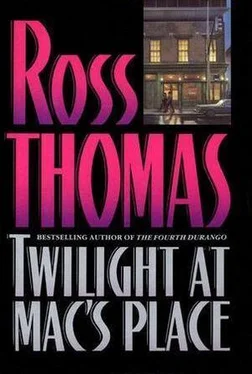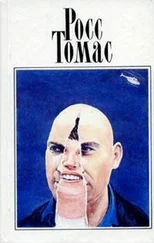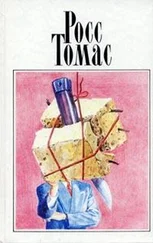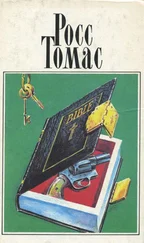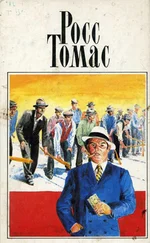“He drops by now and then.”
“For conversation or food?”
“He likes to talk about wine, but never about his job or his wife.”
“What’s wrong with his wife?”
“Nothing — except that when I knew her a long time ago she was still Muriel Lamphier.”
“Lamphier as in Crown-Lamphier?”
Padillo nodded.
“What’s a long time ago?”
“Seventeen, eighteen years back.”
“What happened?”
“Why?”
Haynes smiled his inherited smile. “Just routine.”
“You seem a hell of a lot more routinely interested in Mrs. Keyes than Mr. Keyes.”
“I’m interested in money. It makes me curious. I’m especially curious about a guy who walks into my hotel room and in front of a witness offers me three quarters of a million for all rights to some memoirs that he hasn’t read and probably don’t even exist. He claims he’s offering me government money. Now I hear he’s married to the Lamphier in Crown-Lamphier, which used to make a third of maybe half of this country’s glass, but diversified into electronics, paper, solvents and, for all I know, catfish farming. The former Muriel Lamphier is major money. Keyes married it. You dated it. And my first question is did she and Steady ever have something going?”
Padillo shook his head. “The only connection I know of between her and Steady is that her husband was Steady’s last handler at the agency — or as much of a handler as Steady ever put up with.”
“How do you know that?”
Padillo was silent for a moment, trying to remember. “Isabelle told me.”
Haynes finished his vermouth and said, “Mind talking about it?”
“About Muriel and me?”
Haynes nodded.
Padillo hesitated, then said, “Well, why not? Back then she was twenty-four or twenty-five and I was in my forties. It only lasted a few months. She was a little too rich and a little too wild. The rich I might’ve handled but the wild was just so much bother. After it ended she went out to Los Angeles and fell in with what used to be called the wrong crowd. I think they all had something to do with films.”
“Did she want to act?”
“She had the looks, God knows. But I don’t think she really knew what she wanted. Then something happened in L.A. I don’t know what. Maybe she just got bored. So she came back here and went with the agency.” Padillo paused. “To her it was probably just something to do.”
“She have any qualifications?”
“Looks, brains, connections, sixty or seventy million dollars, good French, fair German and a degree in medieval history. You might say she and the agency made a tight fit.”
A waiter came over to serve the salad. Padillo asked Haynes whether he wanted his salad now or later. Haynes said now was fine.
“Twenty years ago,” Padillo said, “about fifty percent of our dinner customers ate their salads last. Now only ten percent do.”
“When I first got to L.A., some places were serving frozen forks with the salad.”
“Why?”
“I never asked.”
They ate in silence until Haynes finished, put down his fork and said, “What’d she do at the CIA?”
“She was a field hand in operations, which is where she met Keyes. He then seemed headed for one of the top slots, maybe even deputy director, but now he’s one of the might-have-beens. Karl the bartender keeps up with all this stuff and blames Keyes’s fall or decline on his bald head. It’s Karl’s theory that if two male candidates for anything have the same qualifications, the one with the most hair wins.”
“I’ve heard dumber theories,” Haynes said. “But not many.”
“Anyway, Muriel quit the agency in late ’seventy-four and married Keyes in ’seventy-five.”
“She wasn’t with it very long then, was she?”
“A couple of years at most.”
“Ever see her around?”
“The last time was four or five years ago at a Spanish embassy party. The ambassador’s sister and I were attempting a modified flamenco. Muriel came over to compliment us. After the ambassador’s sister drifted away, Muriel and I had a long chat about the weather.”
“She went from wild to tame?”
“So Isabelle said.”
“How would she know?”
“Remember Isabelle’s AF-P story that got killed?” Padillo said. “The one on Casey?”
Haynes nodded.
“While she was working on it, she decided she needed a sidebar on agency wives. Somebody suggested Muriel Keyes. After a lot of trying, Isabelle finally set up an interview and came away with forty-five taped minutes of what she called demure merde.”
The duck arrived and was served with more precision than flourish by Herr Horst himself. He waited until Haynes tasted it, looked up and pronounced it marvelous. Herr Horst, smiling contentedly, turned and marched slowly away.
“You told me you still had a copy of the story Isabelle wrote,” Haynes said, cutting himself another bite of duck.
“In the office.”
“Can I see it?”
“It’s in French.”
“I think I can handle that.”
“Sorry,” Padillo said. “I wasn’t thinking.”
Herr Horst reappeared, carrying a telephone. He plugged it into a jack and placed it beside Haynes’s plate. “It’s Mr. Mott,” Herr Horst said.
Haynes picked up the phone and said, “Yes, Howard?”
“The ex-senator just called me,” Howard Mott said. “His client wants to postpone the bidding for two days. Until Wednesday.”
“Why?”
“The senator says that’s none of our business, but if we still want to do some business, we’d better agree to the postponement. I told him I’d have to check with my client.”
Haynes said, “Call him back and tell him I’ve got a new firm offer of seven hundred and fifty thousand.”
“I don’t lie well enough to convince him of that.”
“You don’t have to. The CIA made the offer in person this afternoon in front of a witness.”
“What witness?”
“Erika McCorkle.”
“Ah.”
“What’s ‘ah’ mean this time?”
“It means I’ll call the senator back and agree to the postponement — providing, of course, that he agrees the bidding will begin at seven hundred and fifty thousand.”
“What d’you think he’ll do?”
“I think that this Wednesday the senator will offer you eight hundred thousand dollars,” Mott said. “The real question, of course, is what will you do?”
“See whether the CIA raises, what else?”
Back in his room at the Willard Hotel, Haynes counted the rings of the phone call he was making. Halfway through the sixth ring, Howard Mott answered with a gruff hello.
After Haynes identified himself, Mott said, “Now what?”
“Suppose I wanted to find out—”
“Why don’t we just skip the ‘suppose’?” Mott said.
“All right. I want to find out where some CIA people worked in nineteen seventy-three and ’seventy-four.”
“Ask the agency.”
“They’d just tell me to fuck off.”
“Sound advice.”
Haynes said nothing, letting the silence build until Mott said, “You’re serious.”
“Very.”
There was another silence, briefer this time, before Mott said, “I can give you a number to call.”
“What about a name?”
“There’s no name. Just some rigamarole.”
Haynes sighed. “Okay.”
“Go to a pay phone and call the number I’m going to give you. You’ll reach an answering machine that’ll repeat the number you’ve just dialed. At the sound of the beep, you say, ‘Warren Oates,’ read off your pay phone’s number and hang up. Got it?”
“Warren Oates,” Haynes said.
“Two minutes after you hang up, the pay phone will ring. Pick up just after the first ring and, instead of saying hello, say — hold on a second—”
Читать дальше
